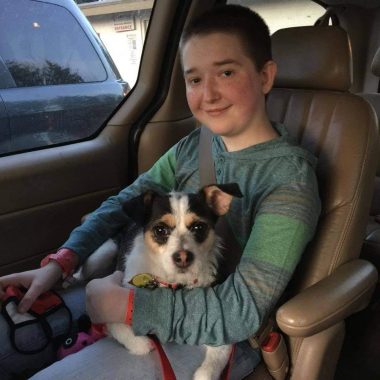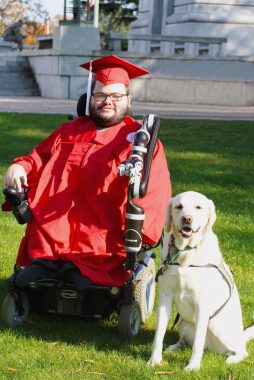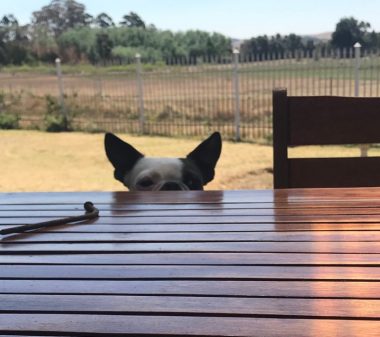Words of Comfort Upon Losing an Emotional Support Dog
Processing the grief that comes with the loss of a pet, service, or support animal

When my son Cullen experienced a fast and critical decline in health after six years of battling pulmonary hypertension (PH), he received a heart and double-lung transplant. Recovery from the surgery was difficult, and the past eight years following transplant have brought various challenges. But Cullen’s dog, Mellow, has been there jumping every hurdle with him.
Cullen’s wish after transplant was to get a puppy. In March 2015, he adopted an 8-month-old Jack Russell terrier from the Humane Society. He named her Mellow because of her calm demeanor.
As Cullen faced post-transplant difficulties, he would often say, “I think I would have lost my mind by now if it weren’t for this dog!”

Cullen brings Mellow home on her adoption day in March 2015. (Photo by Colleen Steele)
Heartbreak
At 23, Cullen is in good health and enjoying his first taste of independence while visiting his brother, Aidan, in Louisiana.
But what he’d hoped would be a happy and memorable experience turned heartbreaking when he received my call to tell him that Mellow had suddenly become very ill and the vet had diagnosed her with canine diabetes.
Despite our best efforts to keep Mellow stable with treatment until Cullen’s return home on Jan. 10, we had to do the loving thing and let her go.
The comfort of shared grief
Mellow wasn’t a licensed service dog, but she was Cullen’s emotional support companion, which made the loss exceptionally difficult. I reached out for understanding and support from two people with the experience of grieving a pet they not only loved, but relied on.
Kevin Schaefer is a fellow columnist over at SMA News Today and the associate director of community content for this site’s parent company, Bionews. In 2020, he lost Pandy, his service dog and loyal companion of 10 years, to a fast and paralyzing illness. Kevin wrote a beautiful tribute to Pandy in his column, “Saying Farewell to My Beloved Canine Assistant.”
Kevin was 16 when he got Pandy and 26 when she passed. In his tribute column, Kevin wrote that “she was always there for me. She challenged me in ways I can’t even put into words, and she helped mold me into a stronger and more empathetic human being.”

Kevin Schaefer at his graduation from North Carolina State University in 2016, with his beloved service dog, Pandy. (Courtesy of Kevin Schaefer)
Tracey Lawrence, a PH and lupus patient, lost her emotional support companion, Abby, in 2021. Tracey rescued two Boston terriers, Abby and Billy, from a puppy mill, and they transformed her life. She went from watching rugby on the sofa every Saturday to training her puppies and interacting with other people.
The passing of Pandy and Abby
Kevin shared via email that Pandy had retired from her duties as a service dog when she passed away. He says that losing her was difficult, but he was glad her sudden illness meant she didn’t have to suffer long.
“I struggled more with losing other friends with SMA,” Kevin wrote. “It’s tough losing a pet or service animal, but the reality is that it’s expected. Dealing with the grief of losing other disabled friends, especially those younger than me, is harder.”
For Tracey, losing Abby was one of the most difficult moments of her life. When Abby started to decline, Tracey was very sick, so her sister and brother-in-law took Abby to the veterinarian. It was an hour’s drive, and Abby was too far gone when they got there.
Tracey felt she’d let Abby down by not being the one to hold her while she left this world.
“She had been the one holding me for so long, and when she needed me to be there for her, I couldn’t be,” Tracey wrote.
Abby’s passing left a huge void in Tracey’s life, but gradually, she could talk about her without crying and remember fondly the pure joy that was Abby. When Abby comes up in conversation, Tracey says it is with love and happy memories rather than sorrow.

Tracey’s dog Abby tries to get the ball thrower off the table. (Courtesy of Tracey Lawrence)
Words of advice
Kevin thinks about Pandy occasionally, but doesn’t dwell on her passing.
“It was a significant chapter of my life, but I’m focused on other things now,” Kevin wrote. “For Cullen, I would say that the grief he’s experiencing now is the worst, but that it will get better with time. Treasure the good memories and know that there will be things to look forward to in the future.”
Tracey has a collage of Abby’s photographs on her bedroom wall, and she finds comfort in looking at the memories.
“Cullen should take comfort in knowing that he gave Mellow the best possible life,” Tracey added. “He did his job and gave her a life full of love and happiness, and no one could ask for more.”
Moving forward
Kevin, in his late 20s, is now focused on a career and is well cared for by a team of people. He has decided not to get another service dog, but knows other people who found that it helped them to move forward.
He believes the experience of having one is worth the inevitable loss that will happen someday. He added, “The whole experience is an emotional roller coaster, but it’s worth it.”
Note: Pulmonary Hypertension News is strictly a news and information website about the disease. It does not provide medical advice, diagnosis, or treatment. This content is not intended to be a substitute for professional medical advice, diagnosis, or treatment. Always seek the advice of your physician or other qualified health provider with any questions you may have regarding a medical condition. Never disregard professional medical advice or delay in seeking it because of something you have read on this website. The opinions expressed in this column are not those of Pulmonary Hypertension News or its parent company, Bionews, and are intended to spark discussion about issues pertaining to pulmonary hypertension.









Leave a comment
Fill in the required fields to post. Your email address will not be published.